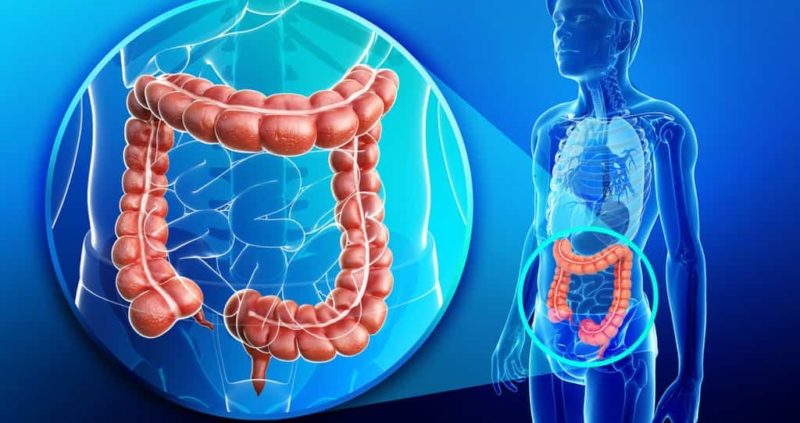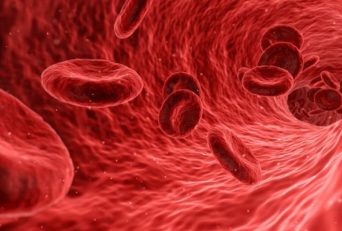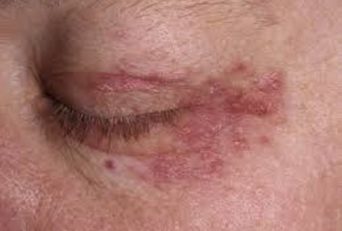The transverse colon is the longest part of your colon. It is located between your ascending and descending colon. In it the arch part of your colon. It is also the most movable part of your colon.
Lets read all about it in the following article.
It is almost completely covered by peritoneum (lining of the abdominal cavity). It is also connected to the inferior border of your pancreas. The main function of your transverse colon is to absorb water and salts. This makes it an important asset to the digestive system.
The transverse colon is actually a hollow tube. It is about 2½ inches (6 cm) in diameter and around 18 inches (46 cm) in length. It forms many pouches (haustra), in the walls of your colon by contracting the smooth muscle of the intestinal walls.
Because of this motion, it mixes up feces by contracting small regions of the intestinal wall. This process is also known as segmentation.
On an average, your colon might experiences about 3 to 12 moderate waves of contractions every minute. This process aids the gut bacteria present in your colon in fermenting the waste product. Because of this fermentation, vitamins and a few trace nutrients remaining in the waste are released.
Table of Contents
Histology Of Transverse Colon
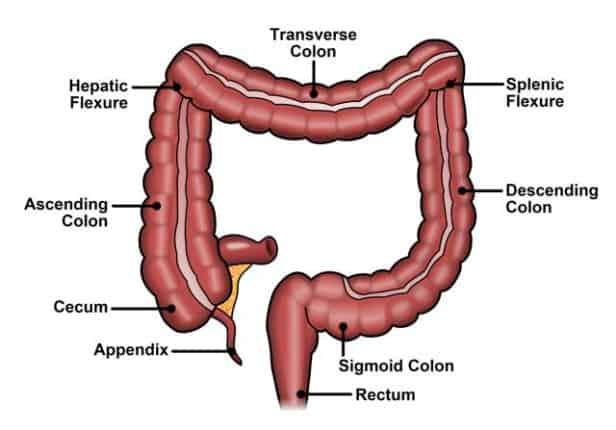
The walls of your transverse colon are made of four tissue layers:
1. Mucosa
It is the innermost layer of epithelial cells in contact with your feces. This lining of your colon is lined with tiny pits. This pit opens into long, tube-like intestinal glands. These glands are lined by specialized cells called goblet cells.
Goblet cells not only absorbs water but also secretes mucus. This mucus lubricates you colon and reduces friction for an easy expulsion of waste from your body. Mucus also protects the lining of your colon against acidic substances and noxious gases.
These specialized goblet cells are responsible for about 10 percent of water absorption from your ingested foods and beverages. Even though it may seem like a small amount, it is, in fact, a significant number to maintain your water balance.
2. Submucosa
It is next to the mucosal layer. It absorbs nutrients and water from faeces and delivers it to your bloodstream. Because it contains many blood vessels. Along with blood vessels, it also contains nerves. Hence this layer is capable of sending nerve impulses.
3. Muscularis
It is deep to the submucosal layer. As the name suggests it consists of several bands of smooth muscles.
4. Serosa
It is the outermost layer of your transverse colon. It acts as the skin of your transverse colon and protects your colon from surrounding damage.
The serosa also secretes a serous fluid. This slick secretion prevents friction between your transverse colon and your other surrounding tissues.
Function Of The Transverse Colon
Once you engulf your food it then enters your digestive tract consisting of stomach, intestines, and rectum. Once food crosses the stomach, the ingested matter moves up your colon. Your transverse colon then facilitates transport of water and nutrients from it to the bloodstream.
Among this, water absorption is the most important function. Your water level is measured by your osmoreceptors and regulated by your brain. Follow by this is the absorption of nutrients. Nutrients are broken down from food by fermentation.
This fermentation process is done by bacteria present in your gut. For such process to occur it’s important that your transverse colon gets a constant supply of oxygenated blood.
Unlike other parts of the large intestine, your transverse colon is highly susceptible to tumors and cancer. Hence it requires your much need attention. Hence periodical check-ups, along with healthy fibre containing diet is very important.
What Is Colon Pain?
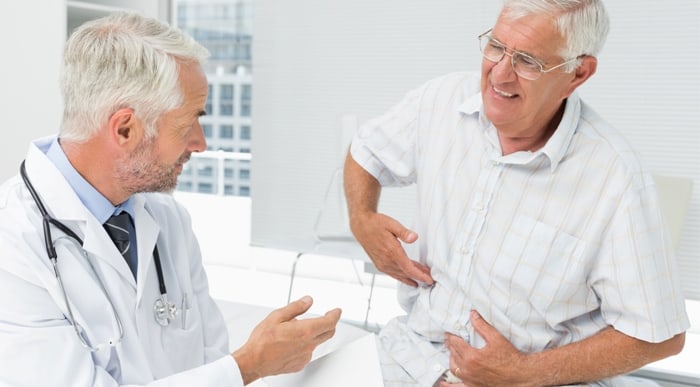
Colon pain is any soreness within your colon. It is a symptom of some underlying disease. In can occur within the abdomen from any specific organ. Colon is responsible for the passage of waste material out of your body. When your colon is diseased it will obstruct passage of waste leading to pain.
Colon Pain Symptoms
Colon pain is a symptom that may accompany :
- Constipation
- Diarrhea
- Excessive flatulence
- Difficulty or pain during defecation (dyschezia)
- Rectal bleeding
- Abdominal distention
- Bloating
- Nausea and or vomiting
Various Colon Conditions
1. Colitis
It is an inflammation of your colon. It can be of different types-
i) Infectious Colitis
It is inflammation of your colon due to an infection. This can be done by bacteria like E.coli, Salmonella, Shigella, and Campylobacter.
ii) Pseudomembranous Colitis
It is an overgrowth of Clostridium difficile bacteria. This generally occurs after use of antibiotics.
iii) Microscopic Colitis
It is an inflammation of the colon wall due to thickening of the connective tissue. Also, it can be due to a higher concentration of white blood cells in your colon (lymphocytic colitis). It can be caused due to an infection or autoimmune disorder.
2. Diverticulosis
In this, small weak areas of your colon’s muscular wall protrude through it. It causes the formation of tiny pouches called diverticuli.
Diverticuli can bleed or become infected / Inflamed. Which can result in abdominal pain, fever, and constipation. But these usually cause no problems. It can arise due to infection or other non-infectious factors like ischemia (reduced blood supply).
3. Colon Bleeding (Haemorrhage)
Rapid bleeding will be visible in your stool else.
4. Inflammatory Bowel Disease
It is also known as Crohn’s disease or ulcerative colitis. It is the most prevalent among other condition. This condition causes pain due to inflammation of the colon. Abdominal pain and diarrhea (can be bloody) are the symptoms.
5. Diarrhoea
Frequent, loose, or watery stools are a sign of diarrhea. Most diarrhea is due to mild infections of the colon or small intestine.
6. Salmonellosis
The bacteria Salmonella is a common contaminant in food. These bacteria can infect your intestine. They cause diarrhea and stomach cramps.
7. Shigellosis
The bacteria Shigella present in contaminated food can invade your colon. Symptoms of shigellosis include fever, stomach cramps, and diarrhea (can be bloody).
8. Colon Polyps
Polyps are small growths in the colon. These sometimes can develop into cancer, but it takes a long time to happen. Removing such polyps can prevent many colon cancers.
9. Colon Cancer
Colon cancer affects more than 100,000 each year in America only. Most colon cancers are preventable but for this through regular screening is required.
10. Bowel Infarction
It is the death of a portion of your colon wall. This occurs due to interruption or stoppage of blood supply (ischemic colitis) to that part. The tissue in that region decomposes to form gangrene.
Colon Tests

1. Colonoscopy
An endoscope (flexible tube with a camera on its tip) is inserted into your rectum. This then advances into your colon. With the help of this, your doctor can examine your entire colon.
2. Virtual Colonoscopy
In this, an X-ray machine and computer generates images of insides of your colon.
3. Stool Occult Blood Testing
Your stool is tested for the presence of blood components. If blood is found in your stool, a colonoscopy may be needed for confirmation of a condition.
4. Colon Biopsy
It is can be done during your colonoscopy. In this, a small piece of your colon tissue is removed for testing. A colon biopsy is usually done to diagnose cancer, infection, or inflammation.
Colon Treatments
1. Antidiarrheal Agents
These agents can slow down your diarrhea and reduce your discomfort.
2. Anti-Inflammatory Medicines
This medication will help you to ease your inflammatory bowel disease symptoms.
3. Antibiotics
Antibiotics will target various bacterias responsible for inflammatory bowel disease.
4. Stool Softeners
This over-the-counter or prescribed medicines can give you relief from constipation. But avoid over usage of them.
5. Laxatives
You can use natural laxatives like castor oil or some over-the-counter medicines. These will provide you relief from your constipation. But an excess of this agents can be harmful to your colon.
6. Enema
It is a liquid pushed into the colon through your anus. This can clear your passage as well as deliver medicines to treat various colon conditions.
7. Polypectomy
Polyps can be cancerous. Hence they can be removed during colonoscopy. This process is called polypectomy.
8. Colon Surgery
This is done in severe cases of bleeding, cancer, or ulcerative colitis. In this, all or a part of your colon is removed (colectomy).
9. Probiotics
Microbes play an important role in your colon’s health. Probiotics are supplements containing microbes which are beneficial for your body. This can help you by providing strength to combat various colon conditions like Crohn’s Disease
Natural Ways To Keep Your Transverse Colon Healthy
Keeping your colon region healthy and clean will help you to prevent chronic constipation.
Here are various natural way to keep your colon healthy and clean-
1. Eat Substantial Meals
When you eat a substantial meal, you stimulate stretch receptors in your stomach. These receptors trigger peristaltic waves in your colon to ensuring regular and ease movement of waste material through your colon. These, in turn, causes efficient passage of stool prevents fecal blockage which causes colon pain.
2. Don’t Suppress Your Nature’s Call
If you regularly suppress the urge to go, your waste materials will spend more time than required in your colon. This will cause excessive dehydration of waste materials and formation of hard stools which are difficult to pass.
3. Ensure Adequate Intake Of Water
The water you ingest is absorbed through your colon. If you drink the insufficient amount of water, it can cause the formation of hard stools leading to constipation. So you should drink an adequate amount of water and also include water-rich foods such as watermelon in your diets.
4. Eat Fiber-rich Foods Regularly
Fiber are not absorbed by the body. So they adds bulk to the boluses of your waste. This additional bulk form softer stools which are easy to pass. Hence reducing addition pressure on your colon. This fiber can be obtained from a diet rich in vegetables, fruits and legumes.
5. Ensure Adequate Vitamin D Levels
Adequate vitamin D significantly lowers your risk of developing cancer. So go for early morning walk to get you Vitamin D fixed. A diet including wild salmon and cod liver oil can also provide required vitamin D.
6. Ensure Adequate Vitamin A Status
As mentioned above, goblet cells release mucus needed to lubricate your feces. vitamin A is needed by these specialized cells to maintain their health and in turn lubricate the passage. Eating fruits and vegetables will help you to get a proper dose of vitamin A.
7. Don’t Ignore You Intake Of Healthy Fats
Your colon like other systems requires a constant influx of fatty acids and cholesterol to remain fully functional. Also, intake of healthy fats is necessary for optimal absorption of fat-soluble vitamin A. Fats are also critical to build and maintain the mucosal lining of your colon.
You can get your required dose of healthy fats from sources such as- avocados, eggs, olives, raw nuts, etc.
8. Build & Maintain Large Colonies Of Friendly Bacteria
Friendly bacteria will promote optimal digestion, thereby preventing the buildup of toxin in your system. They keep another living organism such as fungi, and parasites in check which are capable of creating a menace. Adding probiotics to your diet is the easiest way to build and maintain healthy colonies of friendly bacteria.
9. Work At Feeling Emotionally Balanced
Stress can interfere with your enteric (gut) nervous system. Because of emotional stress you may suffer from chronic constipation. So you are advised to take a careful look and manage your emotional stress more effectively in your life.
10. Consider Multivitamins
If you suffer from Crohn’s disease it can interfere with your ability to absorb nutrients. So in such case you are encouraged to add multivitamin and mineral supplements in your diet. But do take your doctor’s consent before making any drastic change to your diet.
11. Smoking
Smoking increases your risk of developing Crohn’s disease. But if you already suffer from Crohn’s then it may worsen it. Smokers with Crohn’s disease are more likely to have relapses and repeat surgeries.
But on contrary smoking may help you to prevent ulcerative colitis. However, it’s too risk as an option for your overall health.
12. Stress
High stress will only trigger Crohn’s disease symptoms. So it is important to managing your stress levels.
So you can try one of these strategies to manage your stress level:-
i) Exercise
Even mild exercise can help you in long run to reduce stress. Exercise will also relieve depression and normalize your bowel function.
ii) Biofeedback
This is a stress-reduction technique. In this, you train to reduce muscle tension and slow your heart rate. This is accomplished with the help of a feedback machine.
iii) Breathing Exercises.
Another way to cope with stress is to regularly practices and use different breathing techniques. You can even join yoga and meditation classes. If due to busy schedules you can’t devote your time to classes, you can always go for self-help books, CDs or DVDs.
Alternative Medicine For Keep Transverse Colon Healthy
Many people with digestive disorders often prefer to go for some form of complementary or alternative medicine rather than synthetic medicines.
But you should know that majority of alternative therapies aren’t regulated by the FDA.
But if you feel to opt for alternative medicine, remember that it isn’t 100 percent safe. Also, contact and take your doctor’s permission before starting with any alternatives medicines.
Some of the common therapies followed by various individuals are mentioned below:
1. Probiotics
Probiotics are natural supplements containing beneficial bacteria. These bacteria are very much essential for normal functioning of your bowel and might also help you to combat Inflammatory Bowel Disease.
2. Fish Oil
Fish oil contain various antioxidants and anti-inflammatory agents. Hence fish oil can be of great help in dealing with Inflammatory Bowel Disease symptoms. But avoid excessive use because it will cause diarrhea.
3. Aloe Vera
Aloe vera gel is well known for it’s anti-inflammatory effect. It can be of great help in ulcerative colitis, but avoid overuse because it can cause diarrhea.
4. Turmeric
Curcumin, an active compound found in turmeric which has an anti-inflammatory action. So it can be of great use in ulcerative colitis.
5. Acupuncture
In this procedure, fine needles are inserted into your skin. This applied pressure stimulates the release of the body’s natural painkillers. Currently, research is going on to incorporate it in ulcerative colitis therapy.

